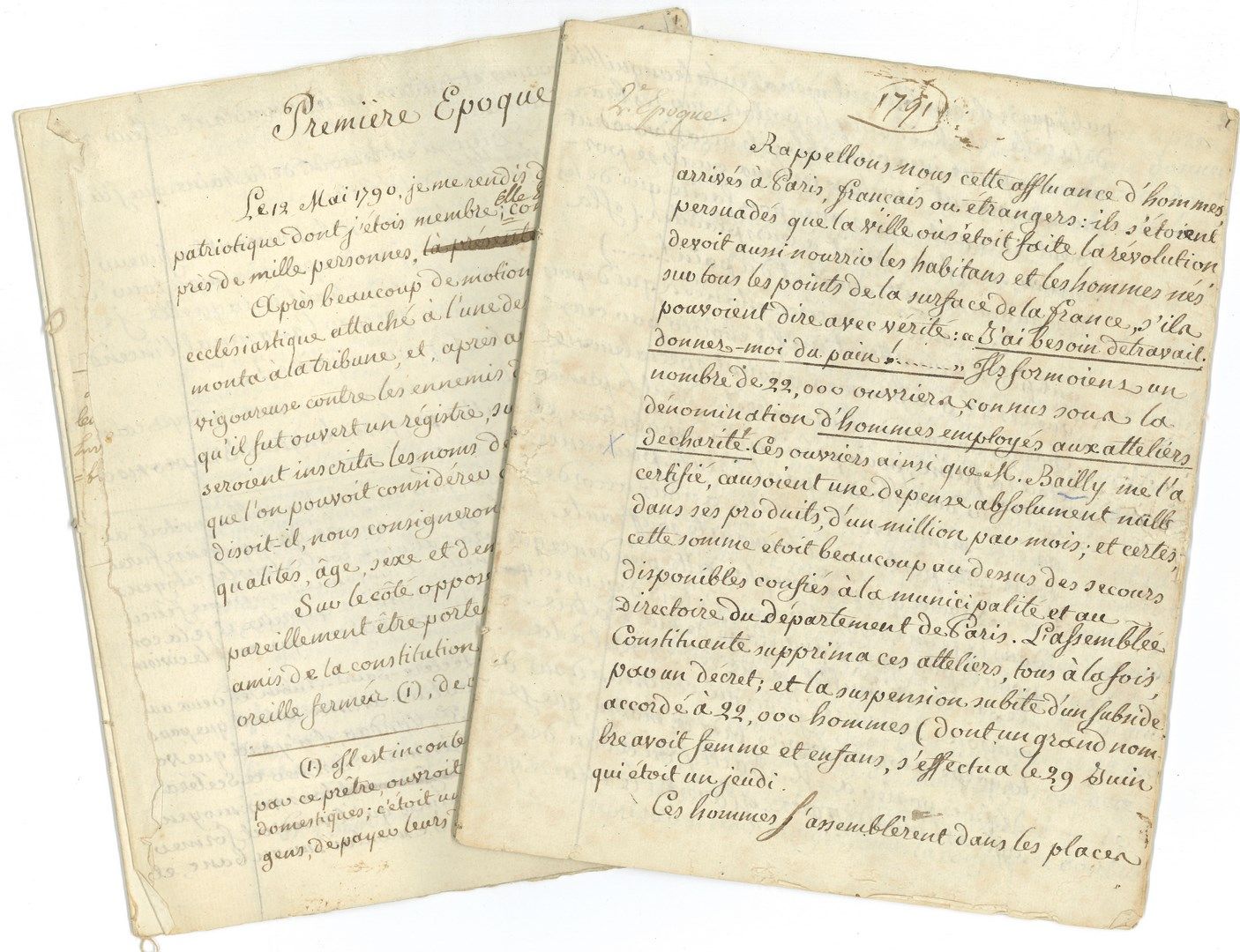Description
Théophile MANDAR (1759-1823) ardent leader of the revolutionary days, commissioner of the Executive Council, writer. MANUSCRIT with autograph corrections, First period and 1791. 2nd period; 2 sewn notebooks of 14 and 23 pages in-4. Curious recollections on two revolutionary episodes, which seem to be unpublished. First period. Relation of an episode of May 12, 1790: during a session of a patriotic society, a fanatical priest, J. Roux, having proposed to create a register where traitors would be denounced, and would name citizens friends of the Constitution to do justice, Mandar improvised a flamboyant speech mixing references to Antiquity, Genesis and modern history, to denounce the call for a new Saint-Barthélemy: "Ah! what would be the elements of happiness for a State, if the citizens of this State were to call crime to the aid of the Fatherland; and if it were established in principle that murder, that arson, that assassination had to be placed in the rank of the weapons intended to protect the citizens!", etc. 1791. 2nd period. After the suppression, by the National Assembly, on June 29, 1791, of the "charity workshops" which employed 22,000 men, Mandar agreed to preside over a delegation of workers who went to the mayor BAILLY on July 1, in order to obtain a relief from the Directory of the department. The next day, a petition was drafted and presented to Citizen Lameth, president of the National Assembly, and that evening, in front of about thirty members of the committees concerned, Mandar gave a vigorous speech: "Rather than succumb to the rage of hunger, twenty-two thousand men would become all-powerful; fear, Gentlemen, that hunger, that misery will finally become a leaven of insurrection, the consequences of which you will find it impossible to stop or prevent. "Mandar summarized the debates with La Rochefoucauld and Bailly, and his counterattack: in the face of the threat to use armed force against the workers, he would rally all the people to him and invest the National Assembly: "the army itself will make way for the procession of hunger"! The story ends with a triumph: on July 3, the Assembly proclaimed new relief, jobs and assistance to return to the country for the unemployed not yet domiciled in Paris on July 14, 1789. Mandar added: "My harangue determined an expenditure, very wise, of 300,000F"...
53
Online
Théophile MANDAR (1759-1823) ardent leader of the revolutionary days, commissioner of the Executive Council, writer. MANUSCRIT with autograph corrections, First period and 1791. 2nd period; 2 sewn notebooks of 14 and 23 pages in-4. Curious recollections on two revolutionary episodes, which seem to be unpublished. First period. Relation of an episode of May 12, 1790: during a session of a patriotic society, a fanatical priest, J. Roux, having proposed to create a register where traitors would be denounced, and would name citizens friends of the Constitution to do justice, Mandar improvised a flamboyant speech mixing references to Antiquity, Genesis and modern history, to denounce the call for a new Saint-Barthélemy: "Ah! what would be the elements of happiness for a State, if the citizens of this State were to call crime to the aid of the Fatherland; and if it were established in principle that murder, that arson, that assassination had to be placed in the rank of the weapons intended to protect the citizens!", etc. 1791. 2nd period. After the suppression, by the National Assembly, on June 29, 1791, of the "charity workshops" which employed 22,000 men, Mandar agreed to preside over a delegation of workers who went to the mayor BAILLY on July 1, in order to obtain a relief from the Directory of the department. The next day, a petition was drafted and presented to Citizen Lameth, president of the National Assembly, and that evening, in front of about thirty members of the committees concerned, Mandar gave a vigorous speech: "Rather than succumb to the rage of hunger, twenty-two thousand men would become all-powerful; fear, Gentlemen, that hunger, that misery will finally become a leaven of insurrection, the consequences of which you will find it impossible to stop or prevent. "Mandar summarized the debates with La Rochefoucauld and Bailly, and his counterattack: in the face of the threat to use armed force against the workers, he would rally all the people to him and invest the National Assembly: "the army itself will make way for the procession of hunger"! The story ends with a triumph: on July 3, the Assembly proclaimed new relief, jobs and assistance to return to the country for the unemployed not yet domiciled in Paris on July 14, 1789. Mandar added: "My harangue determined an expenditure, very wise, of 300,000F"...
